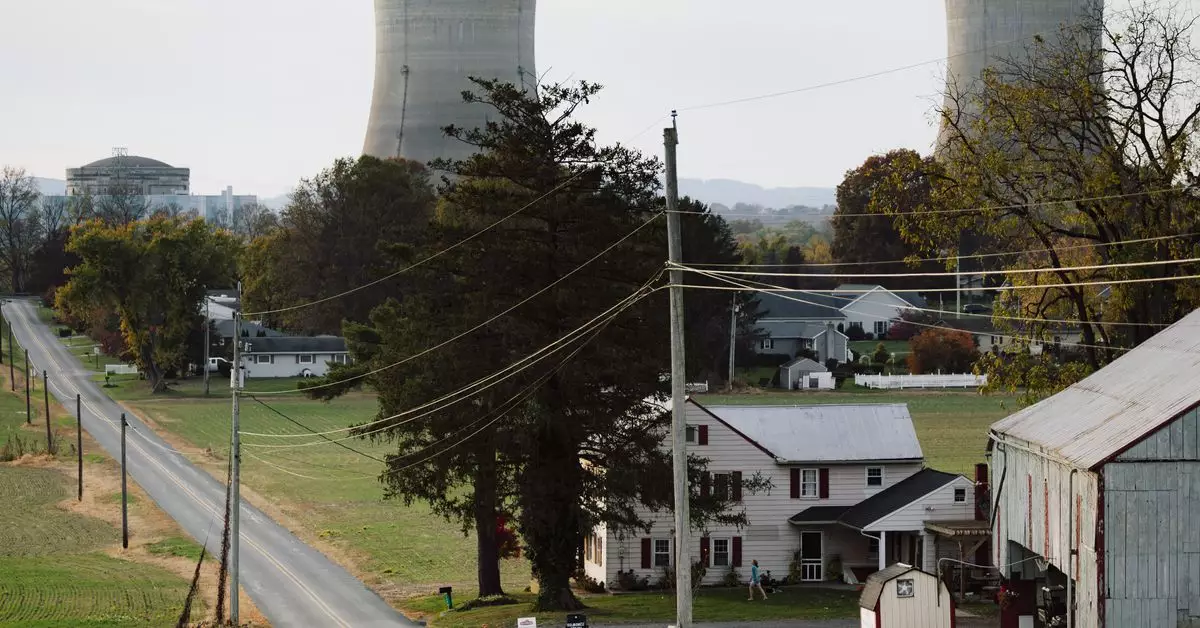As the global energy landscape evolves, the significance of nuclear power is increasingly being recognized, particularly in light of recent contracts that underscore its role in sustainable energy. Recently, the General Services Administration (GSA) announced a groundbreaking nuclear energy contract, signaling a transformative turn in the U.S. government’s approach toward reliable, low-carbon energy sources. This ten-year agreement, valued at $840 million, reflects a strategic decision to embrace nuclear energy amidst growing electricity demands—especially from robust sectors like artificial intelligence.
A Landmark Move for Government Energy Procurement
The GSA’s contract with Constellation, the operator of the largest nuclear fleet in the United States, is a notable milestone in federal energy procurement. The deal encompasses a staggering 10 million megawatt-hours of electricity, sufficient to power over one million homes annually. Particularly, the nuclear component of this deal amounts to approximately 4 million megawatt-hours, emphasizing the government’s commitment to leverage clean energy sources that are both dependable and efficient.
This development aligns with a wider trend among major tech companies. Corporations such as Microsoft and Amazon have recently engaged in significant nuclear agreements to support their expanding infrastructures, particularly the data centers that consume vast amounts of energy. By partnering with Constellation, the federal government is not only seeking immediate energy solutions but also contributing to the long-term sustainability of nuclear energy as a cornerstone of the national energy grid.
With the GSA being the largest single consumer of energy in the United States, this contract is particularly consequential for the nuclear industry. The growing demand for electricity, predominantly fueled by advancements in technology and the expansion of AI, necessitates reliable energy sources that can meet these increasing needs. According to Joe Dominguez, the president and CEO of Constellation, nuclear energy’s previous exclusion from numerous sustainable energy initiatives has changed, marking a pivotal shift in how energy procurement is approached.
The GSA’s contract is expected to influence investment in nuclear infrastructure significantly. It provides Constellation with the financial backing needed to extend licenses for current nuclear facilities and pursue innovations that can enhance energy production capacities. The impact of such investment is projected to yield an additional 135 megawatts of capacity, contributing further to America’s energy independence.
Despite the focus on nuclear energy, questions remain regarding the overall mix of electricity sources in the GSA contract. Constellation, while proud of its achievements in generating over 10% of the nation’s carbon-free electricity—primarily through nuclear, but also from hydro, wind, solar, and some gas—has been tight-lipped about the specifics of how this contract will diversify its energy output. With a goal of achieving 100% carbon-free electricity by 2040, transparency and clarity on this energy mix will be vital in maintaining public trust and ensuring accountability within the energy sector.
Moreover, the fixed-price agreement serves as a buffer against volatile electricity prices, which are expected to escalate due to increased competition among consumers, including massive corporate players and intense demands from data centers. By securing stable costs over a decade, the deal protects federal agencies from potential financial instability, making it a prudent move amid rising energy costs.
The recent push towards nuclear energy is further buoyed by the Biden administration’s endorsement of nuclear power as a critical component in transitioning away from fossil fuels. Recent financial commitments, such as the $1.52 billion loan announced for the revitalization of a retired nuclear plant in Michigan, underscore the administration’s efforts to reinvigorate this energy source—a move that coincides with a growing acceptance of nuclear power in public discourse.
As companies and government agencies alike pivot to nuclear energy, it is crucial to foster a comprehensive understanding of its benefits and risks. The historical stigma surrounding nuclear energy, rooted in high-profile accidents, needs reevaluation in light of modern technology and improved safety protocols. This shift could harness nuclear power’s potential to stabilize energy grids while addressing climate change, thus paving the way for a cleaner, more sustainable energy future.
The GSA’s contract with Constellation not only marks a pivotal moment for nuclear energy procurement in the United States but also symbolizes a broader recognition of nuclear power’s potential to meet evolving energy demands. As the nation navigates its path toward a sustainable and resilient energy future, nuclear energy stands poised to play an instrumental role.


Leave a Reply